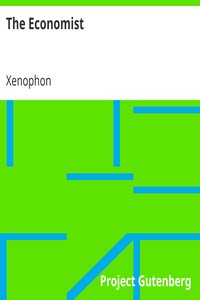The Economist by Xenophon
"The Economist" by Xenophon is a Socratic dialogue written around 362 BC. It explores household management and agriculture through conversations between Socrates and two Athenians. The work examines what constitutes true wealth, the art of managing property and slaves, and the education of wives. Through the gentleman-farmer Ischomachus, Xenophon presents ideas about gender roles, rural life, and leadership that have sparked debate among scholars—some viewing the text as patriarchal, others seeing proto-feminist
elements, and many detecting layers of irony throughout. (This is an automatically generated summary.)
Read or download for free
| Reading Options | Url | Size | |||
|---|---|---|---|---|---|
| Read now! | https://www.gutenberg.org/ebooks/1173.html.images | 260 kB | |||
| EPUB3 (E-readers incl. Send-to-Kindle) | https://www.gutenberg.org/ebooks/1173.epub3.images | 153 kB | |||
| EPUB (older E-readers) | https://www.gutenberg.org/ebooks/1173.epub.images | 160 kB | |||
| Kindle | https://www.gutenberg.org/ebooks/1173.kf8.images | 254 kB | |||
| older Kindles | https://www.gutenberg.org/ebooks/1173.kindle.images | 256 kB | |||
| Plain Text UTF-8 | https://www.gutenberg.org/ebooks/1173.txt.utf-8 | 230 kB | |||
| Download HTML (zip) | https://www.gutenberg.org/cache/epub/1173/pg1173-h.zip | 149 kB | |||
| There may be more files related to this item. | |||||
Similar Books
About this eBook
| Author | Xenophon, 432 BCE-351? BCE |
|---|---|
| Translator | Dakyns, Henry Graham, 1838-1911 |
| Uniform Title | Oeconomicus. English |
| Title | The Economist |
| Note | Wikipedia page about this book: en.wikipedia.org/wiki/Oeconomicus |
| Credits | Produced by John Bickers, and David Widger |
| Reading Level | Reading ease score: 75.6 (7th grade). Fairly easy to read. |
| Language | English |
| LoC Class | PA: Language and Literatures: Classical Languages and Literature |
| Subject | Classical literature |
| Subject | Dialogues, Greek -- Translations into English |
| Subject | Administration of estates -- Greece -- Early works to 1800 |
| Subject | Greece -- Economic conditions -- Early works to 1800 |
| Category | Text |
| EBook-No. | 1173 |
| Release Date | Jan 1, 1998 |
| Most Recently Updated | Jan 16, 2013 |
| Copyright Status | Public domain in the USA. |
| Downloads | 2536 downloads in the last 30 days. |
| Project Gutenberg eBooks are always free! | |

